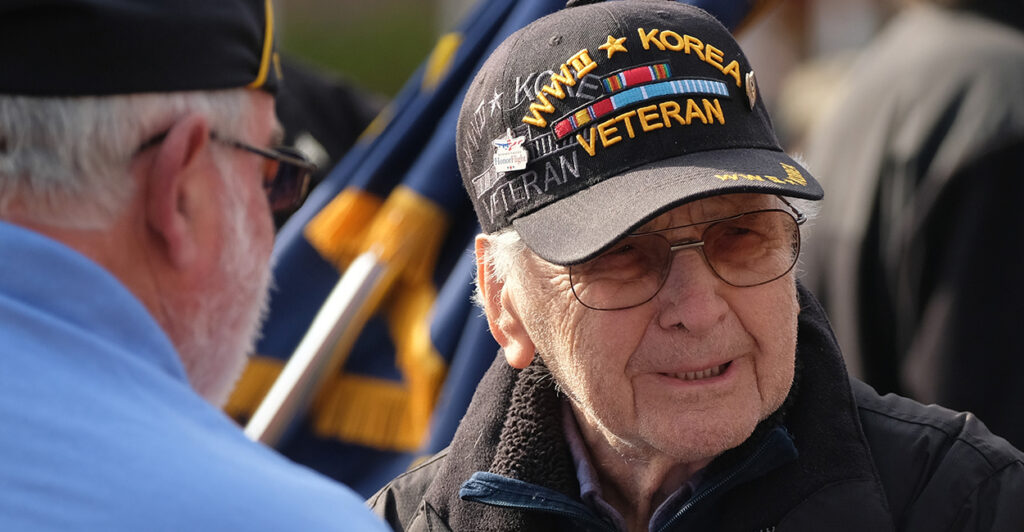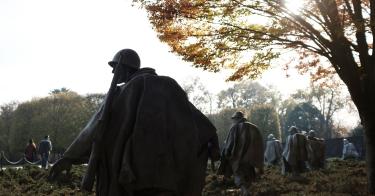Now more than ever, the U.S. military needs young Americans to step up and serve: While the nation faces ever-increasing threats from China, Russia, and Iran, the Army has missed its recruitment goals for the second year in a row, and the other branches are struggling, too.
On Thursday, the United States observes National Korean War Veterans Armistice Day, marking the 70th anniversary of the end of the Korean War. On this day, we remember “The Forgotten War” and honor the men and women who valiantly served their country—many of whom had already served in World War II but stepped up again just five years later when their nation called a second time.
At the end of World War II, the United States and the Soviet Union took control of the Korean Peninsula after Imperial Japan surrendered to the Allied Forces. A line was chosen by the two superpowers, the now infamous 38th parallel, to divide the peninsula into a northern and southern zone.
When the North invaded the South on June 15, 1950, backed by Communist China, President Harry Truman felt compelled to push back against the cancerous spread of communism and defend a democratic government. He ordered additional U.S. forces to South Korea 12 days later, in support of the United Nations mission to defend the South. Over time, 6.8 million American men and women would serve during the war.
Troops fought for three years in unforgiving mountain terrain and freezing temperatures. After a few months of rapid movement at the beginning of the conflict, the war ground to a stalemate. On July 27, 1953, a cease-fire ended the hostilities. That cease-fire agreement is still an important part of the partnership and alliance between South Korea and the United States today, since no peace treaty has been signed to officially conclude the war.
During the Korean War, the U.S. called upon soldiers from all walks of life to fill the ranks, and many went on to contribute even more to society after the war.
Prominent figures who served include astronauts Neil Armstrong and Edwin “Buzz” Aldrin, who would pilot the first mission to the moon in 1969. Ted Williams, a baseball Hall of Famer, first served in World War II and was recalled for military service in Korea, putting his baseball career on pause to serve his country. And the renowned country music artist Johnny Cash enlisted, writing some of his famous songs, like “Folsom City Blues,” during his downtime.

However, one story of bravery and the selfless service of two naval aviators really stands out. Thomas H. Hudner was born in Massachusetts into a middle-class family, and Jesse L. Brown was born in Mississippi to a poor sharecropper. Hudner graduated from the U.S. Naval Academy in 1946, the same year Brown enlisted and became the Navy’s first black pilot.
In December 1950, Brown was forced down behind enemy lines after being hit by antiaircraft fire. Hudner defied insurmountable odds to rescue Brown, avoiding an attack by nearby Chinese soldiers and conducting a deliberate wheels-up landing of his own plane to reach Brown. Hudner tried to free him from the mangled cockpit, but Brown died at the site. Hudner later was able to fulfill the brave pilot’s dying wish, which was to personally let his wife know how much he loved her.
Hudner received the Medal of Honor for his courageous attempt to save Brown by putting his own life at risk. He went on to serve 27 years in the Navy, was promoted to captain, and served an additional 40 years helping military veterans, including as the secretary ofveterans affairs for the Commonwealth of Massachusetts. Every day, he spent his life full of gratitude for having survived combat and paid it forward daily until he died in 2017.
The United States has always relied on brave men and women to voluntarily step into service since the draft ended in 1973. Enlistment issues have not been a major problem until recent years, when in 2022, the Army missed its recruiting goal by 25%.
With an increase in obesity, drug use, and criminal activity among young people, the pool of eligible candidates for our all-volunteer force is diminishing. And many who are able simply choose not to serve. But America needs its youth to answer the call, just as those who served in the Korean War did.
Today, the United States is confronted with a new Cold War with China, and North Korea continues to threaten global stability and the U.S. with its nuclear program. The Russia-Ukraine War and looming threats of a nuclear crisis with Iran also present threats to American interests.
While it often appears that our military leaders today seem more preoccupied with waging the culture wars than real ones, the U.S. military remains the premiere fighting force in the world today. And it continues to need motivated and talented young people joining it to keep it that way.
World War II veteran and former President George H. W. Bush said, “Let future generations understand the burden and the blessings of freedom. Let them say we stood where duty required us to stand.”
The men and women of the Korean War indeed stood where duty required, and America continues to need such brave men and women to fight for the burden and blessings of freedom.
This piece originally appeared in The Daily Signal



